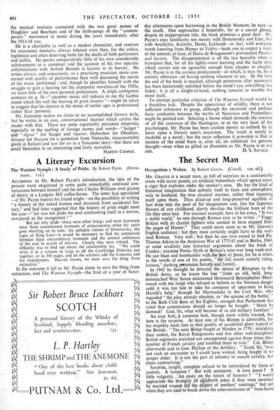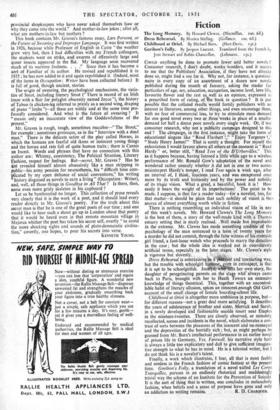The Secret Man
Occupation t Writer. By Robert Graves. (Cassell. r is. 6d.) MR. GRAVES is 'a secret man, as full of surprises as a comfortable room with secret panels, an artificial buttonhole which sprays scent, a cigar that explodes under the smoker's nose. He has the kind of historical imagination that submits itself to facts and atmosphere, wife to husband, the true classical manner, rather than imposing itself upon them. Thus dried-up and long-preserved squillets of fact drop into the pool of his imagination and, like the Japanese flowers of our childhood, slowly develop the brilliant hues of the life they once had. For succinct example, here in his essay, " It was a stable world," he secs through Roman eyes as he writes :" Foggy Britain with its chariot fighters who seemed to have stepped from the pages of Homer." They could never seem so to Mr. Graves's English audience ; but they most certainly might have to the well- read Roman. Very well ; but then he can turn round to find •Pte. Thomas Atkins in the American War of 1775-83 and in Berlin, 1949, or enter eruditely into historical arguments about the book of Exodus ; examine Poetic Myth or Britain's inter-war long week-end. He can blast and bombardier with- the best of them, for he is often, in the words of one of his poems, –the full moon easterly rising, furious," slashing pretension fiercely and funnily. In 1942 he thought he detected the return of Blimpism to the British Army, so he traces the line " from an old, bald,. long- moustached West Saxon nicknamed Hereweard Belemphaltet (Here- weard with the limp) who refused to believe in the Norman danger until it was too late to take his company of spearmen to King Harold's help," through Sir Marmaduke in the Civil War, who regarded " the pike, already obsolete, as the queene of the battle,' " to the Bath Club Bore of the Eighties, enraged that Parliament has ruled that commissions should no longer be bought: " Merit be damned! Gad, Sir, what will become of us old military families! "
An easy butt, common butt, though more wittily treated, but here is the surprise. At leist one of his Blimps, is admirable, for his stupidity leads him to that quality of accidental glory typical of the British: "The next Blimp fought at Minden in 1759 ; mistaking their orders, the Royal Patagonians and five other well-disciplined British regiments marched out unsupported against three times their number of French cavalry and tumbled them to ruin." Col. Blimp . afterwards said to Gen. Phillips of the Artillery : " 'Ecod, Sir, 'twas not such an encounter as I could have wished, being fought in no proper order. It is not the part of infantry to assault cavalry, but clean contrariwise."
Surprise, insight, complete refusal to be intimidated by form or custom. A lampoon ? But with sentiment. A love poem ? A little vulgarity. An essay on.the future of humour ? " Ip would appreciate the brutality of childbirth jokes if they were invented by married wonten fof the d4ti6rt of mothers' meetings," but not when they are used to break down the sales-resistance of " ham-faced provincial shopkeepers who have never asked themselves how or why they came into the world." And mother-in-law jokes ; after all, what are mothers-in-law but mothers ?
This book contains Mr. Graves's famous essay, Lars Porsena, or the Future of Swearing and Improper Language. It was first written in 1926, because while Professor of English in Cairo " the weather grew very hot, then I had difficulties with my French colleagues, the students went on strike, and swarms of offensively large and queer insects appeared in the flat. My language soon recovered much of its wartime foulness. . . ." Since then it has become a sort of Familiar of its author. He revised and republished it in 1935 ; he has now added to it and again republished it. (Indeed, most of the items in Occupation: Writer have been collected before.) It is full of good, though ancient, stories.
The origin of swearing, the psychological mechanisms, the varie- ties of Smut, including literary Smut (" There is record of an Irish • tenor with a flair for polyglot obscenity named Joyce "), the history of Taboo (a chicken-leg referred to primly as a second wing, draping of piano " limbs ")—all these are wittily and .at the same time pro- foundly considered. And what is the future of swearing ? It "means only an inaccurate view of the Goddawfulness of the present." Mr. Graves is rough, tough, sometimes macabre—" The Shout," for example ; sometimes grotesque, as in the " Interview with a dead man." There is the delicate satire of the play called Horses, in which the humans are fearful old ikons or innocent young things and the horses and rats full of quite human traits ; there is Caenis on Incest. Words and phrases that have no connection with this author are: Whimsy, consistency, The Political Situation, Literary Fashion, respect for feelings. But—secret, Mr. Graves'? Has he not revealed himself almost obsessively like a man stripping in public—his army pensidn for neurasthenia, his " difficult time corn- 'plicated by my open defiance of social conventions," his writing " history disguised as novels to earn a living " (Occupation: Writer), and, well, all those things in Goodbye to All That ? Is there, then, some even more grisly skeleton in his cupboard ? Let us be bamboozled no longer. This collection of prose reveali very clearly that it is the work of a poet, and it should lead every reader directly to Mr. Graves's poetry. For the truth about this secret man is that he is one of the great poets of our time ; and one would like to hear such a shout go up in London about that poetry that it would be heard even in that remote mountain village in Majorca whither the poet has taken his secret self, overtly " to avoid the more shocking sights and sounds of pluto-democratic civilisa- tion," covertly, one hopes, to pour his secrets into verse. KENNETH YOUNG.



































 Previous page
Previous page